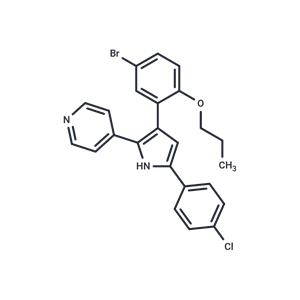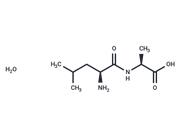| Name | L-168049 |
| Description | L-168049 is a selective and non-competitive antagonist of human glucagon receptor with IC50s of 3.7 nM, 63 nM, and 60 nM for human, murine, and canine, respectively. |
| In vitro | In Chinese hamster ovary cells expressing the human glucagon receptor, L-168049 increases the apparent EC50 of glucagon-stimulated adenylate cyclase and decreases maximal glucagon stimulation with a Kb of 25 nM[1]. L-168049 blocks glucagon-stimulated cAMP formation in mouse liver membrane and inhibits glucagon (100 pM)-stimulated cAMP synthesis in CHO cells expressing the human glucagon receptor with IC50 of 41 nM [3]. |
| In vivo | In the liver of L-G6pc-/- mice, L-168049 (50 mg/kg body; p.o.) reduces Pck1 mRNA expression by half within 6 hours. L-168049 prevents the increase in G6pc expression in the kidney and gut [2]. |
| Storage | Powder: -20°C for 3 years | In solvent: -80°C for 1 year | Shipping with blue ice. |
| Solubility Information | Ethanol : 3.4 mM
DMSO : insoluble
|
| Keywords | L-168049 | L168049 | L 168049 |
| Inhibitors Related | Tirzepatide Acetate(2023788-19-2 free base) | PF-06882961 Tris | PF-06882961 | Glucagon (1-29), bovine, human, porcine hydrochloride | (S, R)-LSN 3318839 | NNC 92-1687 | Adomeglivant | 6α-Methylprednisolone 21-hemisuccinate sodium salt | Orforglipron | LSN3318839 | HAEGTFT acetate(926018-95-3 free base) | LGD-6972 |
| Related Compound Libraries | Bioactive Compound Library | Membrane Protein-targeted Compound Library | Inhibitor Library | Bioactive Compounds Library Max | GPCR Compound Library |

 United States
United States



